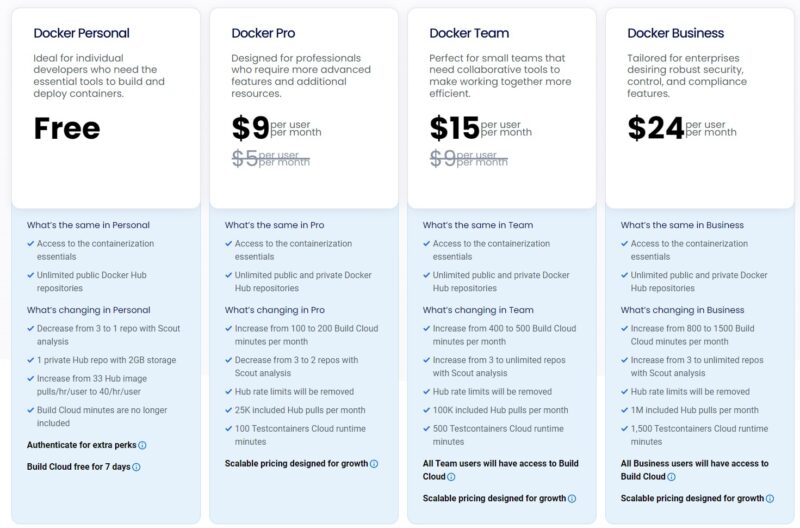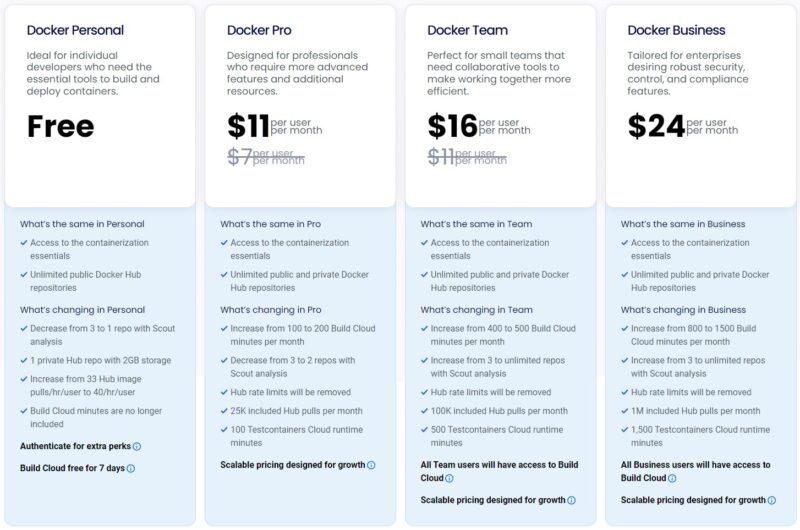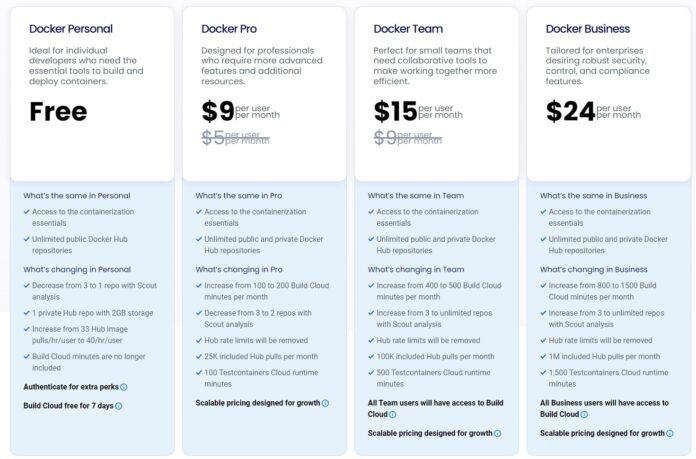Docker, we love. A few years ago, on the STH main site we covered how Docker Abruptly Starts Charging Many Users for Docker Desktop. Now, Docker Pro annual users are seeing an 80% price increase starting in November, and not necessarily the only thing changing as the company is adjusting its benefits while increasing the price.
Docker Raises Prices Up to 80 Percent and More in November
Here is the new annual pricing. This is what some of our back-end team uses and so they are getting impacted by this change. You can see that the Docker Pro is $4/more per user per month for an 80% increase. The cost of compute, storage, and bandwidth is going down, but the price of Docker Pro is rising faster than inflation.

You will notice that one gets double the Build Cloud minutes, but that is just one change. The next line is a decrease in repos with Scout analysis by a third. Here is the current pricing page which says 5000 image pulls per day. With 30 days in a month, that is 150,000 pulls. The new plan is only 25,000 pulls per month, which is an 83% reduction.

Pricing on the monthly side is now much closer. The Docker Pro plan keeps a $24 annual discount the same, which is now $24 off $132. Docker Team is only a $12 discount for paying annually instead of monthly.

There are some new, but also some decreased features across the board.
Final Words
This is not a huge one for many STH readers. Still, it is one that is going to impact folks, and that is a fairly huge price increase especially when not all features are getting increases alongside the price increase.
The pricing changes take effect on the next renewal after November 15, 2024. It would be really neat to see if November 14th is a big day for folks renewing for annual at the current price. Still, we just want to let folks know this is happening in November. You can learn more about it here.





As with anything that started out as “free”, unless they can monetize the end user the general evolution of the “free” product becomes bifurcated: the “free” branch becomes a “community project” whose features lag behind the actively developed branch that is based on monthly fees and-or support contracts.
I think it’s a bad idea to decrease the services while increasing the price. Do one or the other, but doing both at the same time just makes people mad.
I see no mention of the extortionist price hikes and unreasonable image limits on the page at all? 80% price hike for 5GB of hub storage!
IT leaders take note, do you really want a dependency on a company who would literally double your budget over night. This is clear business risk.
It’s a super risky strategy, raising prices on a product aimed at people who have the skills and knowledge to self host a free alternative, a product that by it’s very design is able to be swapped out easily.
Does Docker have anything particularly ‘sticky’ to hang a price increase on?
Being the out-of-box default certainly doesn’t hurt when it comes to getting people who don’t want the hassle to just accept your offer rather than trying to self host or doing a lot of shopping around; but that advantage dries up fast if you push the price into the range where comparison shopping becomes more or less mandatory; or impose limits on things like storage and compute time that make using your EZ-cloud tools more frustrating than convenient.
Is there something important that they’ve kept away from the apache-licensed or directly-dependent-on-native-linux-features aspects of Docker that is genuinely arduous to reproduce and provides a reason to pay their rather optimistic prices for otherwise deeply commodified cloud storage and CPU time; or is this just a deeply optimistic move on their part?
We’ve seen this before from alikes of GitLab for example or Atlassian, but those in my opinion are harder to ditch for a different solution.
I don’t see this as good move from Docker Inc. , and many people might completely step away from Docker even the cli version , especially nowadays is fairly easy to setup a lightweight single or multi node k8s cluster, or just use containerd + nerdctl , rancher desktop or podman desktop
Docker saw what Broadcom was doing and said “Hold my beer!”.
I think they should go the other direction in pro. I’d be willing to contribute $40-50 a year than $10-15/month. That’s just me and I didn’t gain a lot as almost everything I do is open source.
If I get around to it, I’ll probably just switch those to publish to GitHub’s container repository.
This article would have helped if it explained what this was. From the comments I’m inferring that this is something separate to “normal” docker? I’m just getting this article come up in my feed because I’ve been watching videos about Dev containers recently. Is this related to that kind of use or is this something different?I’m none the wiser from this article.